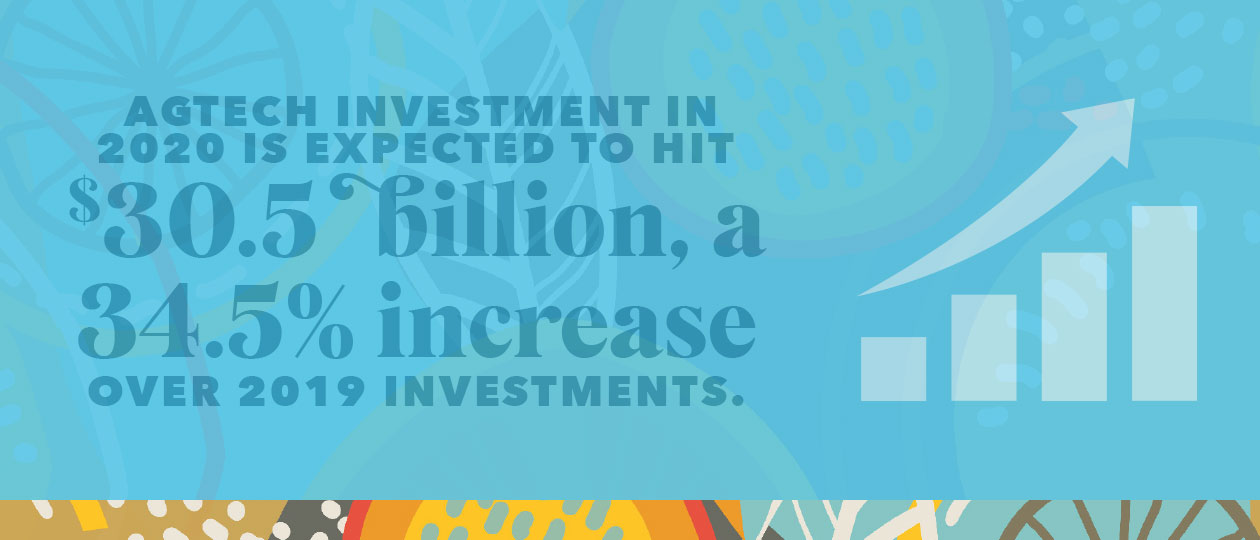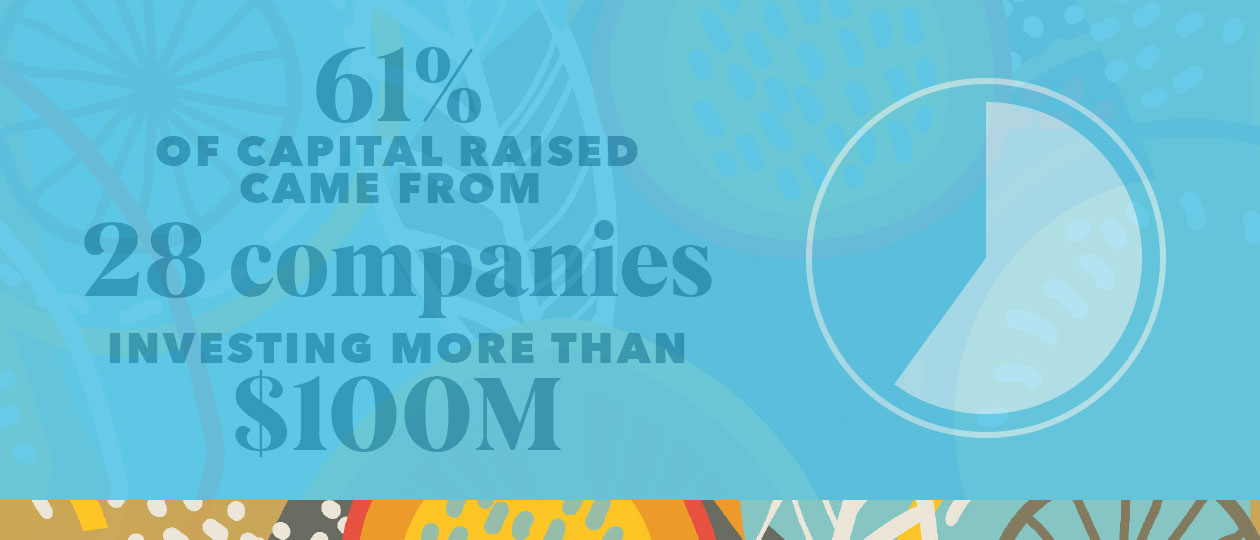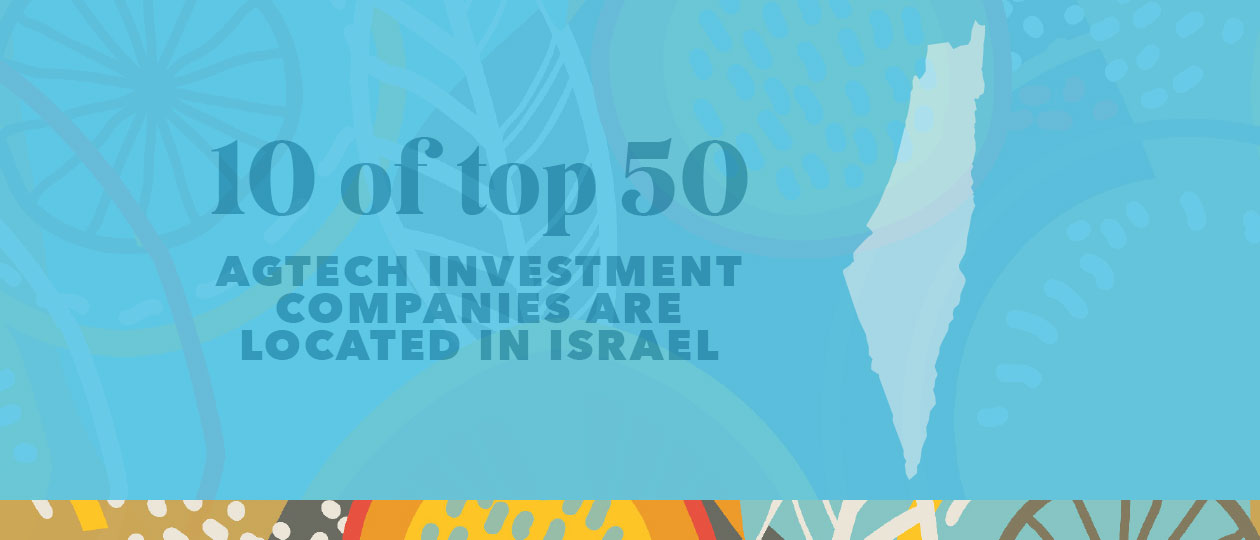For the first time in many years, companies with technology centered on food production at the farm level gained more attention than those at the other end of the food chain. In 2020, upstream technology ventures—those closest to the farm—brought in $15.8 billion across 1,950 deals compared to downstream investments totaling $14.3 billion across 1,142 deals.
“What is exciting about the performance of the upstream side of agrifoodtech is that it signifies investors’ growing confidence with the food and agriculture industry’s tech transition,” says Jessica Pothering with the AgFunder Network. “The technologies closest to the farm tend to be more capital intensive and difficult to test; they also take longer to get to market and secure uptake than their software-heavy downstream peers.”
Investments in technology such as farm robotics, novel farming systems and innovative food products were thought to be too risky. Today general agtech investors are flocking to that technology.
What’s more interesting is how agtech is redefining what is considered “on the farm”, as the idyllic red barn image is being replaced by global positioning systems, sensors that track internal animal temperatures, hydroponic indoor growing technology, remote sensors, drone imaging and other advanced technologies. Investment into innovative food technologies was the third most-funded category in 2020. By the end of June, investments in this category had already surpassed all of 2019 investments.
Most of that investment went to one company: Impossible Foods, which gathered a half billion-dollar investment in March. Memphis Meats, Nature’s Fynd, Good Catch and other alternative meat and dairy companies received significant investments.
This trend toward farm-focused investments is part of continued burgeoning interest in agtech investments. While data is still being analyzed, according to AgFunder’s 2021 AgriFoodTech Investment Report, agtech investment in 2020 is expected to hit $30.5 billion, a 34.5% increase over 2019 investments.

With the interest in agtech investment so strong, the important question remains: who and why?
The who part covers new and unconventional investors. A recent analysis of data by CropLife lists 105 venture capital firms that list agriculture and farming as one of their focused investment areas. Of these firms, 38% have been established since 2015. Also, of the capital raised last year, 61% came from just 28 companies, each contributing $100M or more in capital. That includes investors like Google, which has dumped hundreds of millions into agtech startups over the past decade. Overseas companies are joining in—ten Israeli companies are among the top 50 in agtech investment. Celebrities are even getting involved, including Meghan Markle, Oprah Winfrey and Katy Perry to name a few.

Agtech investment incubators have flourished as well, including companies like Trendlines AgTech, which partners with entrepreneurs, innovators, leading players, and investors to provide access to Israel’s leading agriculture experts and research centers.

Sustainability and security are driving investor interest. Investors continue to pump money into technology that improves biodiversity and enhances sustainable agriculture, while the COVID-19 pandemic fueled the need for technology around food security. Midstream tech companies benefited from delivering technology that helps strengthen the food supply chain. eGrocery startups have grown significantly as more consumers value online grocery shopping and delivery. Evolving consumer demands push investments in innovative food technologies, including alternative protein startups. In emerging agriculture systems, such as indoor hydroponic systems, technology is still catching up with opportunity to make those systems more efficient and productive.
Products from companies with a sustainability footprint are much more attractive to consumers and gaining investor interest. Our own research shows that a solid 80% of consumers indicate sustainability related to food is important to some degree.
As 2021 unfolds, expect agtech investment to expand even further as key drivers continue to mature. What’s more, the opening of travel opportunities as the COVID-19 pandemic retreats will allow entrepreneurs to actually meet personally with investors, making it easier for new entrepreneurs to catch the attention of potential investors.
C.O.nxt Insights
Our team of subject matter experts focuses on food and agriculture—farm field to processing to entrée on a plate. We can help you build a new brand, protect an old one or target customers to foster sales. Let’s talk when the time is right to handle your next strategic marketing and communications challenge: Marcy Tessmann, marcy@co-nxt.com.
C.O.nxt Insight.
Our team of subject matter experts focuses on food and agriculture—farm field to processing to entrée on a plate. We can help you build a new brand, protect an old one or target customers to foster sales. Let’s talk when the time is right to handle your next strategic marketing and communications challenge: Marcy Tessmann, marcy@co-nxt.com.
SHARE THIS STORY
What Would You Solve in 30 Days?
Every brand faces moments when clarity, momentum, or alignment are lacking. Sometimes it’s a new product that needs a smart go-to-market plan. Other times, it’s a shift in the business that calls for a tighter
